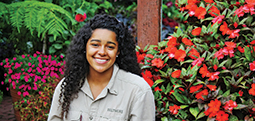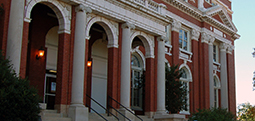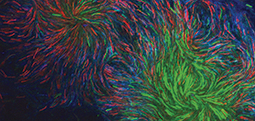| Current Issue | Past Issues | Subscribe | Ag Homepage |

Twist of Fate
Brighter Future in Turfgrass
by
If a car pulling a boat trailer hadn’t bumped into Jared Nash’s mother’s vehicle in Melbourne, Fla., a couple of years ago, Nash would not be pursuing his second bachelor’s degree—this one in turfgrass management—at Auburn University today.
He might still be searching for a decent-paying job in which he could make use of the B.A. degree in nonprofit studies he received from the University of Florida in May 2012, but he wouldn’t be in the turfgrass program at Auburn.
“This all happened, literally, by fate,” he says.
And that does seem to be the case, if you consider (a) that Nash was home for the summer between his junior and senior year at Florida and jobless, (b) that the traffic accident even occurred, (c) that Mrs. Nash and the lady driving the other vehicle struck up a conversation and (d) that the other driver happened to mention that she knew someone who knew someone who owned a Melbourne golf course and was looking for seasonal employees.
“I hadn’t had any luck finding a job that summer, so somehow in their conversation, I think mom wound up telling the lady that if she could help me get on at the golf course, they’d call the wreck a wash,” Nash says. “Anyway, mom came home and said, ‘Call this place now because they’re hiring, and you need a job.’”
That phone call was the beginning of something big in the younger Nash’s future.
“I’d always liked golf, but I guess I’d never thought about how somebody had to keep the course in shape and looking good, and how there were people who actually did that for a living,” Nash says. “I went to work there, and that was the best job I had ever had. I loved it.”
So much so that when he returned to Gainesville that fall, he went straight to faculty in Florida’s turf science program to change his major. But because the turf science curriculum was vastly different from that for nonprofit studies, the faculty advised Nash to go ahead and finish his degree in the not-for-profit realm and then go for a second degree.
It made sense to him and, eventually, it did to the parents of the college senior.
“They weren’t too upset that I wanted to go back to school for another degree in something totally different,” Nash says. “Really, they were glad I had found something I really wanted to do.”
Even as he worked to complete his bachelor of arts degree as a Gator, Nash was investigating turf management programs at universities nationwide, including the one in Auburn’s Department of Crop, Soil and Environmental Sciences.
“I’d heard the program here was really strong, so I came up to visit that summer,” he says. “It was the right fit, and I knew it.”
And this time, it’s the right major, even if he is swamped with all the science and ag-related classes that were not required for the nonprofit studies major at Florida.
“I’m loving it,” says Nash, who started at Auburn fall semester 2012.
With the help of turfgrass management professor Beth Guertal, Nash landed a summer 2013 internship with the Texas Rangers turf team, and since spring, he’s been a student worker with Auburn’s athletic turf and grounds crew. (Yes, he was inside Jordan-Hare, on duty and right there on the field, the evening of Saturday, Nov. 30, when the play of 10 dozen millennia led the Auburn Tigers to a 34-28 victory over the Crimson Tide.)
During his high school years, Nash had been involved in numerous community service activities with charitable organizations, so when he entered Florida as a freshman in 2008, nonprofit studies had seemed to be as good a major to declare as any other. But as early as his junior year there, he had begun to realize that, in the field of nonprofits, good job opportunities might be hard to find.
His career future looks a lot brighter with degree No. 2, which he expects to receive in 2015.
“With this turfgrass management degree, you can go work in any turf field you want, even doing research,” Nash says. “I’ll have a great career, and I’ll be doing something I really enjoy.”








